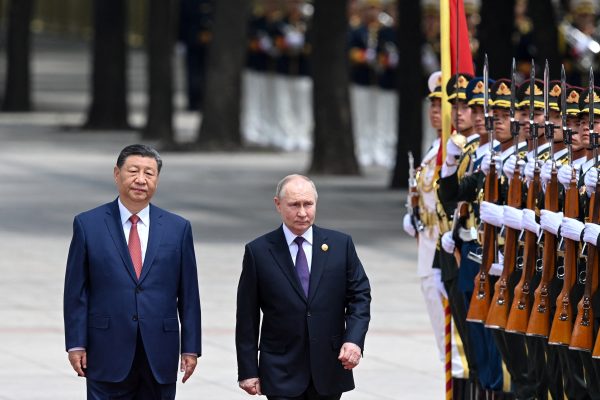They are officially listed as captured in battle, so are not considered traitors by Moscow, but at the same time won’t be included in prisoner swaps or returned to Russia unless they want to be.
Kyiv’s Main Directorate of Intelligence created its “I Want To Live” program in September 2022 to reach out to Russian soldiers who didn’t want to fight Ukraine, offering them the chance to save their lives by becoming prisoners of war.
“On average, a prisoner surrenders every two days,” says Petro Yatsenko, a Ukrainian writer and spokesman for the coordination headquarters for prisoners of war. “There are weeks when no one surrenders. There are weeks when a small unit does — 10 people, for example, a platoon.”
Working with groups of people is best, he says, because organizing each border crossing is a difficult job and involves significant resources that can be more easily justified for a number of people. However, whatever can be done always is done even for one soldier from the other side.
It’s a hazardous process. The military historian John Keegan pointed out that the moment of capture on the frontline is one of the most perilous that any soldier can face. It’s easy for things to go wrong as men cross from one side to the other, but in this war, at least Ukrainians are seeking to minimize the risk.
The program started a few days before the announcement of general mobilization in Russia in 2022 and an early problem was that the Russian soldiers didn’t believe they could really get help.
Many feared the program was an FSB scheme to identify potential deserters. But media work helped. A Ukrainian actor Vitaliy Matvienko, who once starred in a Russian TV series, became spokesman of the project. “A familiar face inspires trust,” Yatsenko says.
It clearly bothered the Russians. The project’s website was swiftly blocked by the Russian state, which showed it was real and enhanced its credibility.
The number of contacts (mostly on social media channels like Telegram, but also including an advertised project hotline) doesn’t usually depend on the intensity of battles in an area but tends to grow when the media gives more attention to the “I Want To Live” initiative, according to the organizers.
For example, after Operation Sinitsya (Titmouse), when a young Russian officer flew an MI-8 helicopter into Ukraine, there was increased contact with potential deserters. The pilot’s family had left Russia in advance, and the other two other crew members didn’t know where they were flying. The helicopter remained intact (although the defecting pilot was later murdered in Spain by suspected Russian agents.)
The number of appeals also increased significantly on the eve of the Ukrainian counteroffensive in summer 2023.
Sometimes the calls come from people who aren’t even serving but suspect they will soon be mobilized. Relatives of Russian soldiers contact the initiative as well, including some from abroad: “Their grandmothers have called from the USA,” Yatsenko says.
The aim is not just for Russians to lay down their arms and cross the frontline, sometimes servicemen want to pass information to Kyiv. In such cases, they might continue to serve in the Russian army, but if they are later captured will be recognized by Ukraine as having helped.
Ukrainian citizens from the occupied territories forcibly conscripted by the Russian armed forces also contacted the program. Some were activists and protesters, who stood against the war but were thrown into the army on the frontline.
Yatsenko says some call and cry that they don’t want to live in Russia: “Please take me away.”
While many plan to go home eventually, if they don’t want to return to Russia when the fighting ends, they don’t have to, Yatsenko says.
“They can stay in Ukraine when the war is over. They will be able to ask for asylum in European countries, we have agreements on that,” he emphasized. “They won’t have to go back.”
Lera Burlakova is a Democracy Fellow at the Center for European Policy Analysis (CEPA.) She is a journalist and former soldier from Ukraine. She was an infantrywoman from 2014-2017 after joining the Ukrainian army following the Russian invasion of Crimea. Her war diary “Life P.S.” received the UN Women in Arts award in 2021.
Europe’s Edge is CEPA’s online journal covering critical topics on the foreign policy docket across Europe and North America. All opinions are those of the author and do not necessarily represent the position or views of the institutions they represent or the Center for European Policy Analysis.





